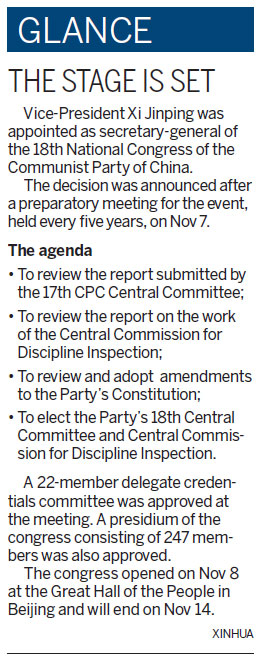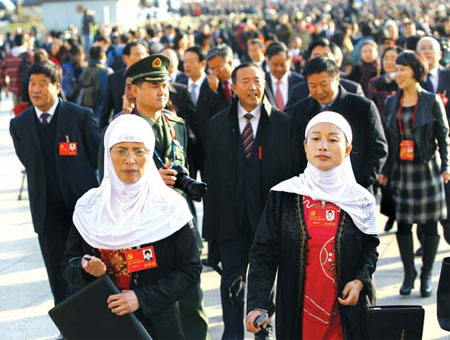Hu sets economic targets at Party meet
Updated: 2012-11-09 08:52
By Hu Yuanyuan (China Daily)
|
||||||||
|
Delegates to the 18th National Congress of the CPC walk to the Great Hall of the People in Beijing for the opening of the congress on Nov 8. Zou Hong / China Daily |

GDP growth, long-term strategy to boost consumer demand key tasks for china
China aims to build a moderately prosperous society in all respects by 2020 and double its GDP by then compared with 2010, Hu Jintao, general secretary of the Central Committee of the Communist Party of China, said.
In a report delivered at the opening of the 18th National Congress of the CPC in Beijing on Nov 8, Hu said China is in a period of strategic opportunities for its development, and much can be achieved.
The country should continue to boost domestic demand, speed up the establishment of a long-term mechanism for increasing consumer demand, unleash the potential of individual consumption, increase investment at a proper pace and expand the domestic market, he said.
China is the world's second-largest economy after surpassing Japan last year, and many are predicting that it can surpass the US before 2020. China's economy grew 7.4 percent in the third quarter, the slowest quarterly growth in more than three years, and growth for the year is expected to be below 8 percent, raising concerns not only about how the country is faring, but also about the effects of that on the global economy.
The Party congress, which runs until Nov 14, will set new policy directions and elect new leaders for the next five to 10 years.
The three main events of the congress are: review of the report submitted by the 17th CPC Central Committee, which summarizes achievements and talks of future directions; amendments to the Party's Constitution, enabling the Party to adapt to changing conditions and set new policy priorities; and the election of the Party's 18th Central Committee, which will hold its first plenum immediately after the congress to elect the general secretary, members of the Politburo and other senior leaders.
The political report is essentially a policy manifesto that offers clues about possible changes in policy direction.
In 1992 the 14th CPC National Congress officially identified the establishment of a socialist market economy as a policy goal. This helped overcome resistance to reform policy and opened the door for the wave of market-oriented liberalization in the ensuing 20 years.
Amendments to the Party's Constitution that year also allowed many private entrepreneurs to become Party members, something that could not have happened earlier because the Party previously positioned itself as a representative of workers and peasants.
This year among the 2,000-plus delegates are 26 representing migrant workers, which is a first.
The composition of the Politburo and of the Politburo Standing Committee are receiving widespread attention because their members will make the key decisions on China's policies over the next 10 years.
According to a research note by Barclays, questions of particular interest to investors include who will be the new members of the Politburo Standing Committee, the country's highest political decision-making body, and whether the new leaders will announce political and economic policy breakthroughs at the congress.
Huang Yiping, an economist with Barclays, says that while the composition of the committee is important because individual senior leaders have different policy leanings and personal styles, the structure suggests continuity of direction for key political and economic policies.
"The younger and better-educated new leaders will probably focus more on structural reforms to promote growth sustainability."
However, implementation of important new policy steps will probably have to wait until at least the third plenary session of the Central Committee, to be held about a year from now, a Barclays' research note says.
In Huang's view, investors expecting a big stimulus package after the Party congress are likely to be disappointed, although the new leaders will probably introduce some new projects.
"We expect the new government to introduce more investment projects, but also to rule out the possibility of more big stimulus measures."
The primary reasons, most analysts say, are lessons learned from the government's 4 trillion yuan ($640 billion; 502 billion euros) stimulus measures in 2008 and the fact that the economic slow-down is as much structural in nature as it is cyclical.
Many economists say China's economy probably bottomed out in the third quarter and may well achieve growth of 8 percent for the year.
"Potentially, this could imply downside risks for the economy after the congress if investors and entrepreneurs are expecting significant policies to support the economy," Huang says.
"They will probably be disappointed."
Although the economy has grown strongly for the past 10 years despite the global financial crisis, economic risks have also increased, including the state sector's continued dominance of resource allocation and growing fiscal and financial fragility.
The current growth model relies on free-market mechanisms for products, but also the government's ability to mobilize resources. However, as the economy reaches the high middle-income level, innovation and industrial upgrading is becoming key to sustainable growth.
"We think the new leaders fully understand these challenges and will take steps to alleviate them," Huang says.
However, Huang says it is possible for the new leaders to harvest some low-hanging economic fruit. Some reforms have already been extensively discussed and even experimented with, such as the household registration system, interest-rate liberalization, resource pricing and taxes. Changes in these areas could be introduced in more regions, or the whole country, relatively quickly.
"We might hear about some of these measures during the Party congress, the annual economic work conference in early December or at the National People's Congress in early March," Huang says.
For many multinational companies doing business in China, the major concerns are policy continuity and stability.
Edward Nusbaum, CEO of the accounting firm Grant Thornton International, says: "We hope the new leadership will continue to create an environment to support the business growth of foreign enterprises and promote further integration with the global economy."
Yan Xuan, president of the market research company Nielsen Greater China, says an open and transparent investment environment will help fuel China's economic growth.
"We hope the new leadership will continue to offer an open and welcoming attitude for foreign investors."
Sarah Butler, managing director of the consulting firm Booz & Company Greater China, says the company still sees short-term uncertainty in some companies in China.
"We expect with the leadership transition that there will be more certainty and confidence in the long-term fundamentals of China's economy, even though there will be challenges ahead in the next stage of China's growth and development."
huyuanyuan@chinadaily.com.cn
(China Daily 11/09/2012 page3)

 Relief reaches isolated village
Relief reaches isolated village
 Rainfall poses new threats to quake-hit region
Rainfall poses new threats to quake-hit region
 Funerals begin for Boston bombing victims
Funerals begin for Boston bombing victims
 Quake takeaway from China's Air Force
Quake takeaway from China's Air Force
 Obama celebrates young inventors at science fair
Obama celebrates young inventors at science fair
 Earth Day marked around the world
Earth Day marked around the world
 Volunteer team helping students find sense of normalcy
Volunteer team helping students find sense of normalcy
 Ethnic groups quick to join rescue efforts
Ethnic groups quick to join rescue efforts
Most Viewed
Editor's Picks

|

|

|

|

|

|
Today's Top News
Chinese fleet drives out Japan's boats from Diaoyu
Health new priority for quake zone
Inspired by Guan, more Chinese pick up golf
Russia criticizes US reports on human rights
China, ROK criticize visits to shrine
Sino-US shared interests emphasized
China 'aims to share its dream with world'
Chinese president appoints 5 new ambassadors
US Weekly

|

|







